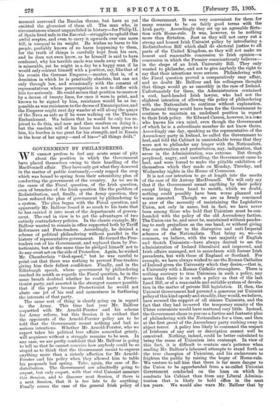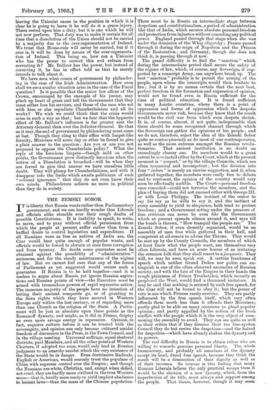W E cannot profess to feel any acute sense of pity
about the position in which the Government have placed themselves owing to their handling of the MacDonell affair. They have only got what they deserved in the matter of public contumely,—only reaped the crop which was bound to spring from their astonishing plan of conducting the government of the country. As we see in the cases of the Fiscal question, of the Irish question, even of branches of the Irish question like the problem of Redistribution, and, finally, of the Army question, they have reduced the plan of government by philandering to a system. The plan began with the Fiscal question, and apparently Mr. Balfour found it so much to his taste that he has carried it into moat of the departments of govern- ment. The end in view is to get the advantages of two entirely contradictory policies. In the classic example, Mr. Balfour wanted to remain in office supported both by Tariff Reformers and Free-traders. Accordingly, he devised a scheme of political philandering without parallel in the history of representative government. He turned the Free- traders out of his Government, and replaced them by Pro- tectionists, but at the same time he pledged himself not to do any overt act on the side of Protection. Again, he wished Mr. Chamberlain " God-speed," but he was careful to point out that there was nothing to prevent Free-traders giving him their fullest confidence. Finally, and in the Edinburgh speech, where government by philandering reached its zenith as regards the Fiscal question, he in the same breath doubted whether he could lead a Protec- tionist party, and asserted in the strongest manner possible that if the party became Protectionist he would not abate one jot of his zeal and earnestness in furthering the interests of that party. The same sort of thing is clearly going on in regard to the Army. This time last year Mr. Balfour coquetted with Mr. Arnold-Forster and his scheme for Army reform, but this Session it is evident that the opponents of the Arnold-Forster policy are to be told that the Government meant nothing and had no serious intentions. Whether Mr. Arnold-Forster, who we expect takes his political love affairs somewhat grimly, will acquiesce without a struggle remains to be seen. In any case, we are pretty confident that Mr. Balfour is going to tell us that he cannot conceive how anybody could be so stupid as to think that the Government meant to express anything more than a sisterly affection for Mr. Arnold- Forster and his policy when they allowed him to table his proposals last spring. Take, again, the case of Re- distribution. The Government are admittedly going to coquet, but only coquet, with that vital Unionist measure this Session, and to discover next Session, if there is a next Session, that it is too late to do anything Finally comes the case of the general Irish policy of the Government. It was very convenient for them for many reasons to be on fairly good terms with the Irish party. Accordingly they set up an agreeable flirta- tion with Home-rule. It was, however, to be nothing more than flirtation. Just as they will not carry out a strong and honest Irish Unionist policy by introducing a Redistribution Bill which shall do electoral justice to all parts of the United Kingdom, so they will not make an honest and reasonable concession to Irish opinion—a concession in which the Premier conscientiously believes— in the shape of an Irish University Bill. They only wanted to philander, and not to give anybody the right to say that their intentions were serious. Philandering with the Fiscal question proved a comparatively easy affair, and no doubt Mr. Balfour and his colleagues thought that things would go as smoothly in the case of Ireland. Unfortunately for them, the Administration contained a cool, hard-headed Irish lawyer, who had not the slightest intention of allowing the policy of philandering with the Nationalists to continue without explanation. The natural thing would have been for the Government to continue to maintain an undefined position in regard to their Irish policy. Sir Edward Carson, however, is a man who knows his own mind, even though the Government of which he is a subordinate member do not know theirs. Accordingly one day, speaking as the representative of the Ascendency party in Ireland, he called the Government to heel, and told the Cabinet in unmistakable terms that they were not to philander any longer with the Nationalists. The consternation and perturbation, nay, indignation, that arose in the Administration, was extreme. But though perplexed, angry, and unwilling, the Government came to heel, and were forced to make the pitiable exhibition of themselves which they made on Monday, Tuesday, and Wednesday nights in the House of Commons.
It is not our intention to go at length into the merits of the case of Sir Antony MacDonell. We will only say that if the Government meant anything by their policy except living from hand to mouth, which we doubt, nothing could possibly have been worse planned and worse executed. Though we are as firmly convinced as ever of the necessity of maintaining the Legislative Union, not only in name, but in fact, we have never been among those who hold that Unionism must be con- founded with the policy of the old Ascendency faction. The Union can be, and must be, maintained without pander- ing to such prejudices on the one hand, or without giving way on the other to the disruptive and anti-Imperial schemes of the Nationalists. That being so, we—in common, we believe, with the vast majority of English and Scotch Unionists—have always desired to see the administration of Ireland liberalised and improved, and Irish affairs managed, not in accordance with former Irish precedents, but with those of England or Scotland. For example, we have always wished to see the Roman Catholics of Ireland given the University which they desire,—that is, a University with a Roman Catholic atmosphere. There is nothing contrary to true Unionism in such a policy, any more than there is in such a policy as that of the last Land Bill, or of a reasonable and suitable system of devolu- tion in the matter of private Bill legislation. If, then, the Unionist Government had pursued a generous yet Unionist policy of this kind openly and steadily, they would, we believe, have secured the support of all sincere Unionists, and the fact that they had incurred the temporary enmity of the Ulster extremists would have mattered very little. Instead, the Government chose to pursue a furtive and fantastic plan of philandering with the Nationalists for a time, and then at the first growl of the Ascendency party rushing away in abject terror. A policy less likely to command the respect of Irishmen of any sort or description cannot well be conceived. Nothing, indeed, could be better calculated to bring the cause of Unionism into contempt. In view of this fact, it is difficult to contain one's patience when reading Mr. Balfour's laboured attempts to stand forth as the true champion of Unionism, and his endeavours to frighten the public by raising the bogey of Home-rule. We venture to tell him that there is far more danger to the Union to be apprehended from a so-called Unionist Government conducted on the lines on which he conducts his Cabinet than from any Liberal Adminis- tration that is likely to hold office in the next ten years. We would also warn Mr. Balfour that by leaving the Unionist cause in the position in which it is clear he is going to leave it he will do it a grave injury. There rested upon him a duty, but it is one which he will not now perform. That duty was to make it certain for all time that a dissolution of the Union should not be carried by a majority due to the over-representation of Ireland. We trust that Home-rule will never be carried, but if it ever is, it will be done by means of the over-representa- tion of Ireland. This being so, how can a Unionist who has the power to correct this evil refrain from correcting it? Mr. Balfour has the power, but instead of correcting it, he has in effect told us that he merely intends to talk about it.
We have seen what comes of government by philander- ing in the case of the Irish Administration. How soon shall we see a similar situation arise in the case of the Fiscal question ? Is it possible that the senior law officer of the Crown, encouraged by the example of his junior, may pluck up heart of grace and tell the Government that they must either lose his services, and those of the men who act with him, or else repudiate Chamberlainism and all its works ? We wish we could think that the crisis would arise in such a way as that; but we fear that the hypnotic effect of Mr. Balfour's influence is far greater over the Attorney-General than over the Solicitor-General. Be that as it may,the end of government by philandering must come at last. Though they cling to their office with limpet-like ferocity, Ministers will some day or other be forced to give a plain answer to the question : Are you or are you not prepared to oppose the Chamberlain policy ? What the reply of the ferocious limpets—though mild on other points, the Government grow distinctly ferocious when the notion of a Dissolution is broached—will be when they are forced to give that answer we have ourselves little doubt. They will plump for Chamberlainism, and with it disappear into the limbo which awaits politicians of such " colossal ignorance " that they do not even know their own minds. Philanderers achieve no more in political than they do in society.







































 Previous page
Previous page